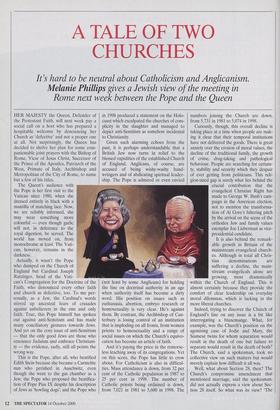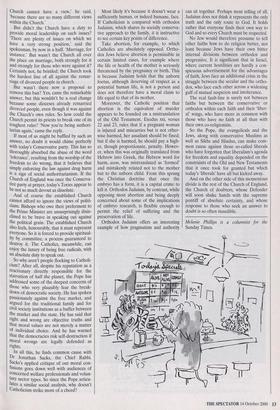A TALE OF TWO CHURCHES
It's hard to be neutral about Catholicism and Anglicanism.
Melanie Phillips gives a Jewish view of the meeting in
Rome next week between the Pope and the Queen
HER MAJESTY the Queen, Defender of the Protestant Faith, will next week pay a social call on a host who has prepared a hospitable welcome by denouncing her Church as 'defective' and not a proper one at all. Not surprisingly, the Queen has decided to shelve her plan for some com- panionable joint prayers with the Bishop of Rome, Vicar of Jesus Christ, Successor of the Prince of the Apostles, Patriarch of the West, Primate of Italy, Archbishop and Metropolitan of the City of Rome, to name but a few of his titles.
The Queen's audience with the Pope is her first visit to the Vatican since 1980, when she dressed entirely in black with a mantilla of matching lace. Now, we are reliably informed, she may wear something more colourful — even though garlic will not, in deference to the royal digestion, be served. The world has moved on, from monochrome at least. The Vati- can, however, remains in the darkness.
Actually, it wasn't the Pope who dumped on the Church of England but Cardinal Joseph Ratzinger, head of the Vati- can's Congregation for the Doctrine of the Faith, who denounced every other faith and church as defective, too. To me per- sonally, as a Jew, the Cardinal's words stirred up ancestral fears of crusades against unbelievers in the one and only faith. True, this Pope himself has spoken out against anti-Semitism and has made many conciliatory gestures towards Jews. And yet on the core issue of anti-Semitism — that the only good Jews are those who renounce Judaism and embrace Christiani- ty — the evidence, sadly, still all points the wrong way.
This is the Pope, after all, who beatified Edith Stein because she became a Carmelite nun who perished in Auschwitz, even though she went to the gas chamber as a Jew; the Pope who proposed the beatifica- tion of Pope Pius IX despite his description of Jews as 'howling dogs'; and the Pope who
in 1998 produced a statement on the Holo- caust which exculpated the churches of com- plicity in the slaughter and managed to depict anti-Semitism as somehow incidental to Christianity.
Given such alarming echoes from the past, it is perhaps understandable that a British Jew now turns in relief to the blessed vapidities'of the established Church of England. Anglicans, of course, are accused of being wishy-washy hand- wringers and of abdicating spiritual leader- ship. The Pope is admired or even envied (not least by some Anglicans) for holding the line on doctrinal authority in an age when authority itself has become a dirty word. His position on issues such as euthanasia, abortion, embryo research or homosexuality is very clear. He's against them. By contrast, the Archbishop of Can- terbury is losing control of an institution that is imploding on all fronts, from women priests to homosexuality and a range of social issues on which the Church's equivo- cation has become an article of faith.
And it's paying the price in the remorse- less leaching away of its congregations. Yet on this score, the Pope has little to crow about. For Catholicism is also in difficul- ties. Mass attendance is down, from 32 per cent of the Catholic population in 1987 to 25 per cent in 1998. The number of Catholic priests being ordained is down, from 7,021 in 1981 to 5,600 in 1998. The numbers joining the Church are down, from 5,731 in 1981 to 5,074 in 1998.
Curiously, though, this overall decline is taking place at a time when people are mak- ing it clear that their temporal institutions have not delivered the goods. There is great anxiety over the erosion of moral values, the decline of the traditional family, the growth of crime, drug-taking and pathological behaviour. People are searching for certain- ty, stability and security which they despair of ever getting from politicians. This reli- gion-sized gap is surely what lies behind the crucial contribution that the evangelical Christian Right has made to George W. Bush's cam- paign in the American election, not to mention the transforma- tion of Al Gore's faltering pitch by the arrival on the scene of the orthodox Jew and family values exemplar Joe Lieberman as vice- presidential candidate.
It is also behind the remark- able growth in Britain of the mainstream evangelical church- es. Although in total all Chris- tian denominations are suffering a decline, the main- stream evangelicals alone are growing, most dramatically within the Church of England. This is almost certainly because they provide the comfort of clear leadership on everyday moral dilemmas, which is lacking in the more liberal churches.
Indeed, trying to discover the Church of England's line on any issue is a bit like interrogating a blancmange. What, for example, was the Church's position on the agonising case of Jodie and Mary, the Siamese twins for whom separation would result in the death of one but failure to separate would result in the death of both? The Church, said a spokesman, took no collective view on such matters but would merely explain how difficult it all was.
Well, what about Section 28, then? The Church's compromise amendment that mentioned marriage, said the spokesman, did not actually express a view about Sec- tion 28 itself. So what was its view? 'The Church cannot have a view,' he said, `because there are so many different views within the Church.'
But didn't the Church have a duty to provide moral leadership on such issues? `There are plenty of issues on which we have a very strong position,' said the spokesman, by now in a huff. 'Marriage, for instance.' But wasn't the Church all over the place on marriage, both strongly for it and strongly for those who were against it? Certainly not, he bristled; the Church took the hardest line of all against the remar- riage of divorced people in church.
But wasn't there now a proposal to remove this ban? Yes, came the remarkable answer, but this wouldn't be a real change because some dioceses already remarried divorced people, even though it was against the Church's own rules. So how could the Church permit its priests to break one of its toughest rules? 'Now you're being authori- tarian again,' came the reply.
If most of us might be baffled by such an answer, no doubt it would chime perfectly with today's Conservative party. This has so thoroughly absorbed the abuse of the word `tolerance', resulting from the worship of the freedom to do wrong, that it believes that simply enforcing the law against drug harm is a sign of social authoritarianism. If the Church of England was once the Conserva- tive party at prayer, today's Tories appear to be not so much devout as dissolute.
And of course the established Church cannot afford to ignore the views of politi- cians. Bishops who owe their preferment to the Prime Minister are unsurprisingly disin- clined to be brave in speaking out against the political grain. The established Church also feels, honourably, that it must represent everyone. So it is forced to provide spiritual- ity by committee, a process guaranteed to destroy it. The Catholics, meanwhile, can enjoy the luxury of being free radicals, with an absolute duty to speak out.
So why aren't people flocking to Catholi- cism? After all, despite his reputation as a reactionary directly responsible for the starvation of half the planet, the Pope has addressed some of the deepest concerns of those who very plausibly fear the break- down of democratic society. He has spoken passionately against the free market, and argued for the traditional family and for civil society institutions as a buffer between the market and the state. He has said that right and wrong are objective truths and that moral values are not merely a matter of individual choice. And he has warned that the democracies risk self-destruction if moral wrongs are legally defended as rights.
In all this, he finds common cause with Dr Jonathan Sacks, the Chief Rabbi. Sacks's applied critique of our moral con- fusions goes down well with audiences of concerned welfare professionals and volun- tary sector types. So since the Pope articu- lates a similar social analysis, why doesn't Catholicism strike more of a chord? Most likely it's because it doesn't wear a sufficiently human, or indeed humane, face. If Catholicism is compared with orthodox Judaism, which shares its socially conserva- tive approach to the family, it is instructive to see certain key points of difference.
Take abortion, for example, to which Catholics are absolutely opposed. Ortho- dox Jews believe abortion is permissible in certain limited cases, for example where the life or health of the mother is seriously threatened by the pregnancy or birth. This is because Judaism holds that the unborn foetus, although deserving of respect as a potential human life, is not a person and does not therefore have a moral claim to life equal to that of its mother.
Moreover, the Catholic position that abortion is the equivalent of murder appears to be founded on a mistranslation of the Old Testament. Exodus xxi, verses 22 and 23, rules that if a pregnant woman is injured and miscarries but is not other- wise harmed, her assailant should be fined; but if she is harmed, he should pay a high- er, though proportionate, penalty. Howev- er, when this was originally translated from Hebrew into Greek, the Hebrew word for harm, ason, was mistranslated as 'formed' and mistakenly related not to the mother but to the unborn child. From this sprang the Christian doctrine that once the embryo has a form, it is a capital crime to kill it. Orthodox Judaism, by contrast, while opposing most abortion and being deeply concerned about some of the implications of embryo research, is flexible enough to permit the relief of suffering and the preservation of life.
Orthodox Judaism offers an interesting example of how pragmatism and authority can sit together. Perhaps most telling of all, Judaism does not think it represents the only truth and the only route to God. It holds rather that everyone finds their own way to God and so every Church must be respected.
No Jew would therefore presume to tell other faiths how to do religion better, not least because Jews have their own bitter internal divisions between orthodox and progressive. It is significant that in Israel, where current hostilities are hardly a con- spicuous advertisement for the advantages of faith, Jews face an additional crisis in the struggle between the secular and the ortho- dox, who face each other across a widening gulf of mutual suspicion and intolerance.
The real fault-line is surely not between faiths but between the conservative or orthodox within each faith and their 'liber- al' wings, who have more in common with those who have no faith at all than with their own co-religionists.
So the Pope, the evangelicals and the Jews, along with conservative Muslims as well as Sikhs and Hindus, can make com- mon cause against those so-called liberals who have forgotten that liberalism's agenda for freedom and equality depended on the constraints of the Old and New Testaments that it once took for granted but which today's 'liberals' have all but kicked away.
And on the other side of this momentous divide is the rest of the Church of England, the Church of doubters, whose Defender will soon shake hands with the supreme pontiff of absolute certainty, and whose response to those who seek an answer to doubt is so often inaudible.
Melanie Phillips is a columnist for the Sunday Times.



















































































 Previous page
Previous page